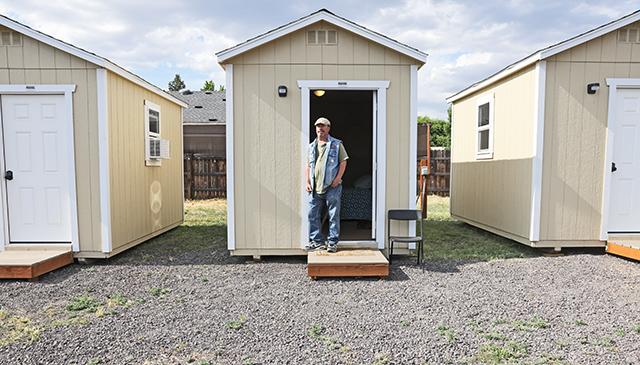Providers worried about state cuts to homelessness programs
Published 1:48 pm Thursday, June 19, 2025

- James Miller stands in the doorway of his outdoor shelter unit at Central Oregon Villages’ Dean Swift annex in Bend. 06/10/25 (Dean Guernsey/The Bulletin)
Oregon’s revenue shortfall has led state lawmakers to cut funding that helped prevent thousands of Oregon households from slipping into homelessness, leaving some local service providers wary about their ability to address the crisis.
A revenue forecast released last month gave the legislature about $750 million less to spend than previously thought, due to uncertainty over President Donald Trump’s federal economic policies. That’s led to reductions in allocations for agencies across the state government.
That includes the Housing and Community Services department, which distributes money for homelessness services to regions across the state. A bill passed by a budget committee largely maintains funding to keep homeless shelters open across the state but slashes money to help people who are at risk of being evicted pay rent.
The bill allocates about $34 million for homelessness prevention, about one-quarter of the funding supplied during the previous two-year budget cycle.
“A cut like this means more people camping in the forests, more families living in their cars, and more people seeking limited shelter options,” said Donna Burklo, interim director of homeless service provider Central Oregon Villages, said in a statement. “Many of them will be seniors, who are getting hit with several cuts to assistance.
Funding for preventing evictions in Central Oregon is funnelled through NeighborImpact, a basic needs nonprofit serving Deschutes, Jefferson and Crook counties. Since 2023, the nonprofit has received nearly $4.2 million in eviction prevention funds from the state, according to Autumn Rackley, director of housing for NeighborImpact. That was enough to assist 3,322 people who might have otherwise been evicted for an inability to pay rent, according to Rackley.
About $2.8 million of the region’s allocation came from executive orders signed by Gov. Tina Kotek, which declared a homelessness emergency and injected millions of dollars across the state into shelter operations, rehousing and eviction prevention. Kotek’s proposed budget — drafted before the state economist’s dismal forecast — would have maintained the current level of homeless services across the state with $217 million for shelters and $173 million for eviction prevention.
The budget bill allocates $205 million for shelters.
Uncertainty over federal programs and the drop off of COVID-era spending means housing programs are taking a hit, said Rep. Emerson Levy, D-Bend, who serves on the budget committee that passed the funding cuts.
“We simply don’t have the same amount of money to invest,” Levy said in a phone interview Wednesday. “We feel the same pain as all Oregonians on this. But we are in a constrained budget environment and we need to fund the very basic stuff first.”
“Our shelters were going to close without this money,” Levy added.
The city of Bend uses state funding to sustain operations at four shelters, providing for 272 of the 550 shelter total shelter beds within the city limits.
“At the proposed level of funding, the city is cautiously optimistic many local shelter resources can be maintained over the biennium,” Fraley said in an email Wednesday.
But housing advocates, who have called for lawmakers to reverse the cuts, say eviction prevention is being overlooked.
According to the Oregon Law Center, which provides legal services for low-income people, there were more than 27,000 court evictions filed in Oregon last year.
In a press release, advocacy group Oregon Housing Alliance said the budget bill would be enough for only 4,300 people over the next two years.
Scott Cooper, executive director of NeighborImpact, said the proposed cuts would mean it will have to turn more people away. The nonprofit prioritizes eviction prevention funds based on how close tenants are to being evicted for not paying rent.
Cooper said he believes the increase in homelessness funding two years ago has created a more widespread and stable system of services than before, and that continuing those investments is the best way to continue addressing the problem.
“The move away from prevention dollars—less rent assistance and less eviction prevention—feels short sighted,” Cooper said in an email Wednesday. “All the research says that the least expensive and least disruptive way to manage homelessness is to prevent it in the first place.”
Tammy Baney, executive director of the Central Oregon Intergovernmental Council, said the regional agency is “deeply disappointed” about substantial cuts to eviction prevention.
“Communities need a range of tools to support individuals, youth, and families in securing safe and affordable housing,” Baney said in a statement. “This begins with preventing homelessness—an approach that helps stabilize lives, improves productivity among workers, and ensures that young people enter the classroom ready to learn.”







